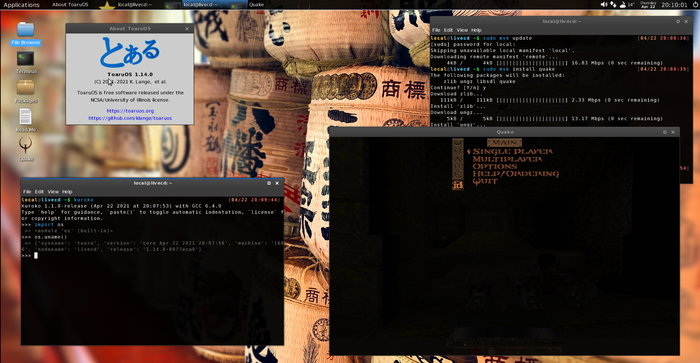Available Project Issue toaruos 1.14 , which develops from scratch-written Unix-like operating system with its core, loader, standard SI library, batch manager, user space components and a graphical interface with a composite window manager. At the current stage of the development of the system’s capabilities is enough to perform Python 3 and GCC. The project code is written in the Si language and extends under a BSD license. For the download prepared Live-image , size of 14 MB, which can be tested in QEMU, VMware or VirtualBox.

The project started in 2010 in the University of Illinois and first developed as research in the field of creating new composite graphical interfaces. Since 2012, the development has been transformed into the TOARUOS operating system developed in at the beginning as a student project, and then overlooking the day of the day off, praised by the community formed around the project. This form, the system is equipped with Composite window manager , supports dynamically binding executable files in ELF format, multitasking, graphic and Network stack.
The delivery includes the port of the Python 3.6 programming language, which is used in the development of some TaRuos-specific graphics applications, such as a batch manager, graphic editor, PDF viewer, calculator, simple games. From portable for TOAUOS third-party programs, Vim, GCC, Binutils, Freetype, MUPDF, SDL, Cairo, Doom, Quake, Super Nintendo Emulator, BOCHS, etc. are marked. The project also develops its own dynamic programming language Kuroko , designed to replace Python when developing utilities and user applications for the system.
The basis of the TOARUOS is a kernel using a hybrid modular architecture that combines the monolithic base and tools for using the downloadable modules, in the form of which the most available device drivers, such as Disk Drivers (PATA and ATAPI), FS EXT2 and ISO9660, Framebuffer, Keyboards, mice, network cards (AMD PCnet Fast, Realtek RTL8139 and Intel Pro / 1000), audio chips (Intel AC’97), as well as VirtualBox add-ons for guest systems.